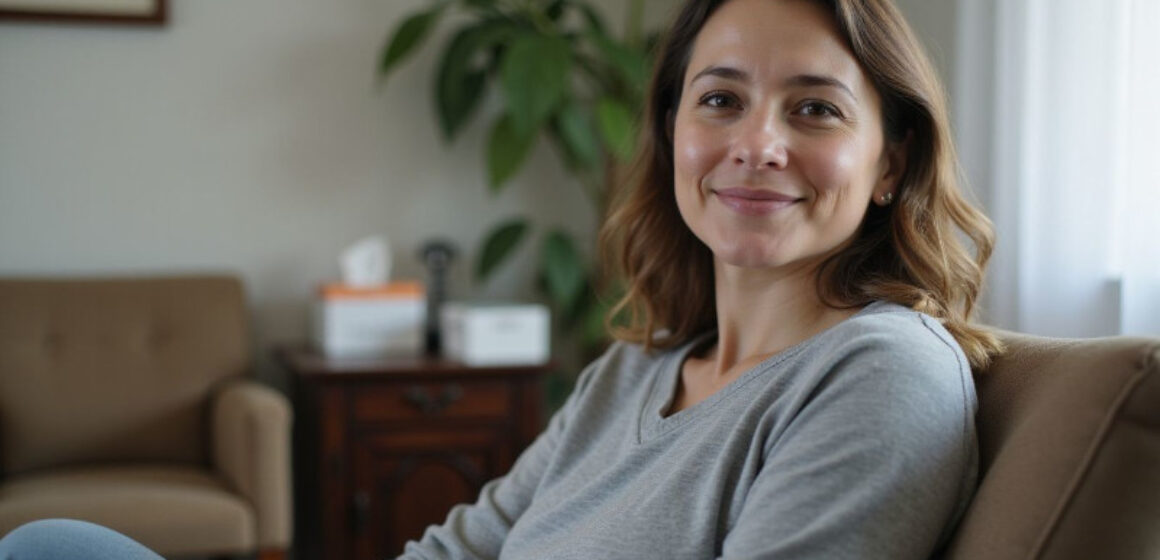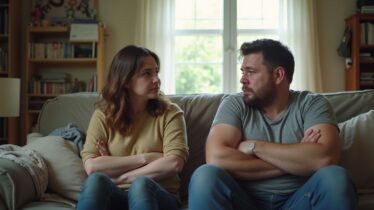What To Expect In Your First Pre-Divorce Counseling Session
Going through a divorce is like walking through a storm – you don’t have to face it alone. Pre-divorce counseling gives you a safe place to sort out your feelings before ending your marriage.
While many couples skip this key step, studies show that counseling helps 3 out of 4 people make better choices about their future. In our sessions, you’ll learn to process your thoughts, deal with grief, and build skills for your next life chapter.
As your marriage and family therapist in San Mateo, CA, I know how hard these changes can be. I blend proven methods like cognitive behavioral therapy with caring support to help protect your mental health during this rough patch.
Your path to healing starts with that first brave step of reaching out. Let’s work together to help you move forward with clarity and hope.
Key Takeaways
- Pre-divorce counseling helps 75% of people make better choices about ending their marriage. The first session creates a safe space to share feelings and set goals.
- Your counselor will check your mental health and emotions. You’ll talk about what makes you angry or sad in your marriage. Simple tasks like writing in a journal help you understand your feelings better.
- Dr. O, who has helped over 1,000 couples, says both partners should stay open and honest. She teaches couples to use “I feel” statements instead of blame words during fights.
- The first session covers three main areas: building trust with your counselor, talking about emotions, and making clear goals. Your counselor will help you spot bad habits in how you talk to each other.
- Many couples do both single and couple sessions to get the most help. This mix helps them learn better ways to handle problems and make smart choices about their future.
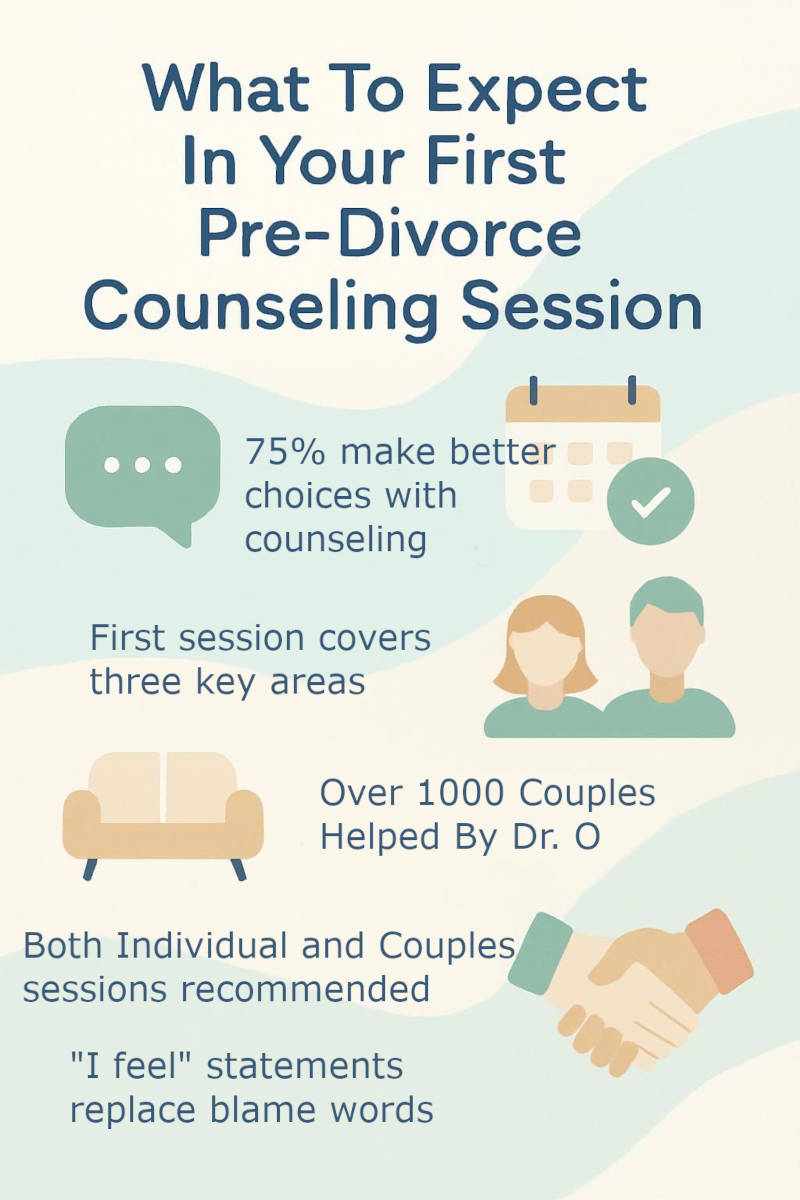
Purpose of Pre-Divorce Counseling
Pre-divorce counseling helps couples make clear choices about their marriage. My role as a therapist focuses on giving couples tools for better communication and problem-solving skills.
This type of counseling creates a safe space to explore feelings, cope with anger, and deal with anxiety about the future.
The main goal is to guide couples through their emotional well-being during this hard time. Some couples find new ways to fix their marriage, while others move toward a peaceful split.
Mental health support matters a lot here – I teach coping mechanisms and self-compassion methods that work for both paths.
Setting the Stage: What Happens in the First Session
The first pre-divorce counseling session opens a safe space for you to share your story with a trained therapist. You’ll find comfort in this private setting as your counselor guides you through a gentle yet direct talk about your feelings, hopes, and goals.
Building rapport with your counselor
I meet every client with warmth and openness in my San Mateo CA therapy practice. My goal stays simple: creating a safe space where couples feel heard and understood. Most clients notice their anxiety fade as we talk about their hopes for marriage counseling.
A strong bond with your therapist helps build trust and emotional support. During our first meeting, I share clear details about confidentiality and my approach to couples therapy.
Many partners tell me they feel more at ease knowing what to expect. This open talk helps us focus on your relationship goals and start positive changes right away.
Discussing your current emotional and mental state
Your counselor needs to know your mental state during the first pre-divorce session. My role focuses on creating a safe space for you to share your feelings about the marriage. Most clients express a mix of emotions like anger, sadness, or resentment.
These feelings help shape your therapy goals and coping skills.
Mental wellbeing starts with honest self-expression.
The session explores your emotional health through simple questions about daily moods and stress levels. My clients often talk about their worries, regrets, and hopes for the future.
This helps build positive psychology techniques for your healing journey. The talk therapy process lets you speak freely about marriage problems without judgment.
Outlining goals for the counseling process
I set clear goals with my clients during pre-divorce counseling. The main focus stays on mental well-being and positive emotions through this tough time. Most couples need help with communication skills, conflict resolution, and self esteem building.
The counseling process creates a safe space to express feelings and work through grief.
My therapy sessions help couples make smart choices about their future. We talk about practical matters like childcare, custody arrangements, and family systems. The goals often include learning forgiveness, managing depression, and building resilience.
Through emotion focused therapy, I guide couples to understand their motivations and reasons for their choices.
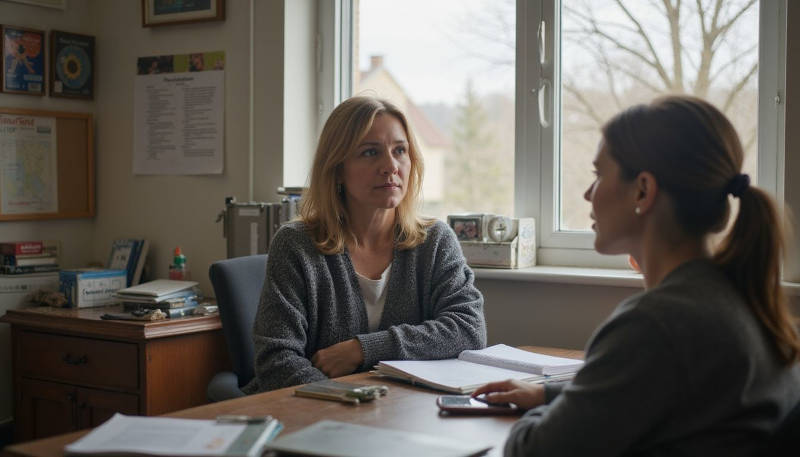
Key Topics Addressed in the First Session
Your counselor will guide you through deep talks about your feelings, triggers, and ways you speak to each other – I’ll share more details about these key topics in my next post.
Exploring relationship dynamics
I help couples map out their relationship patterns in the first pre-divorce counseling session. Most couples show clear signs of poor communication, lack of emotional support, or trust issues.
Through marriage therapy techniques, we explore how each person reacts during conflicts and what triggers negative responses. This process helps me identify the root causes that led to thoughts about divorce.
The counseling room becomes a safe space to discuss intimate relationships and mental health conditions. My role focuses on guiding both partners to share their views about their marriage struggles.
Many couples discover hidden patterns they never noticed before. Through mindfulness exercises, I assist them in seeing how past experiences shape their current behaviors. This deeper understanding often leads to better choices about their future together or apart.
Identifying emotional triggers and concerns
Your counselor will guide you through a process to spot emotional triggers during your first session. Marriage and family therapists use specific tools to help couples name their raw feelings.
These tools include journaling exercises and guided self-reflection tasks. The goal is to find what sparks negative reactions in your relationship.
My role as a couples therapist focuses on creating a safe space to explore painful emotions. Each partner needs to share their concerns about the relationship without fear. The treatment plan will address common triggers like money stress, trust issues, or past traumatic experiences.
This step helps build a clear path toward healing or accepting the need to part ways.
Assessing communication patterns
I notice that most couples show clear signs of poor communication during pre-divorce counseling. Many partners talk over each other or stay silent during tough talks. Through family counseling, I help couples spot these patterns through simple exercises.
One partner might always blame while the other shuts down. These habits create a cycle that makes relationship problems worse.
My telepsychiatry sessions focus on fixing these broken patterns right away. I teach couples to pause, listen, and speak clearly without anger. The healthiest couples learn to share feelings without attacking each other.
This skill helps them make better choices about their future together or apart. Fritz Heider’s work shows that good communication builds trust and understanding between partners.

Tools and Techniques You May Encounter
I use proven tools to help you understand your feelings and thoughts during our first session. My clients learn simple ways to talk better and solve problems through guided exercises.
Guided self-reflection exercises
My counseling sessions start with simple self-reflection tasks. Clients write down their feelings about their marriage in a private journal. These exercises help couples spot patterns in their relationship counseling journey.
The tasks include rating daily mood levels and noting specific events that caused happiness or stress.
The exercises create a safe space for honest thoughts about the ex spouse and current emotions. Through guided meditation and breathing exercises, couples learn to process their grief without judgment.
Many partners find these tools helpful for managing burnout and adjustment disorder during this tough time. My clients often report feeling more clear-headed after completing these reflection activities.
Conflict resolution strategies
I teach couples simple tools to handle conflicts better in my therapy sessions. The first step focuses on active listening – each partner takes turns to speak without interruption while the other shows they understand.
Next, I guide them to use “I feel” statements instead of blame words, which helps reduce anger during tough talks. This method works great for most of my clients who need help with love and leadership in their relationships.
The next part involves practical exercises to spot early warning signs of conflict. I show couples how to take short breaks when emotions run high, and come back ready to solve problems together.
These steps have helped many couples in my psychiatric practice move from fighting to fixing issues as a team. Clear rules about fair fighting make a big difference in how partners work through their problems.
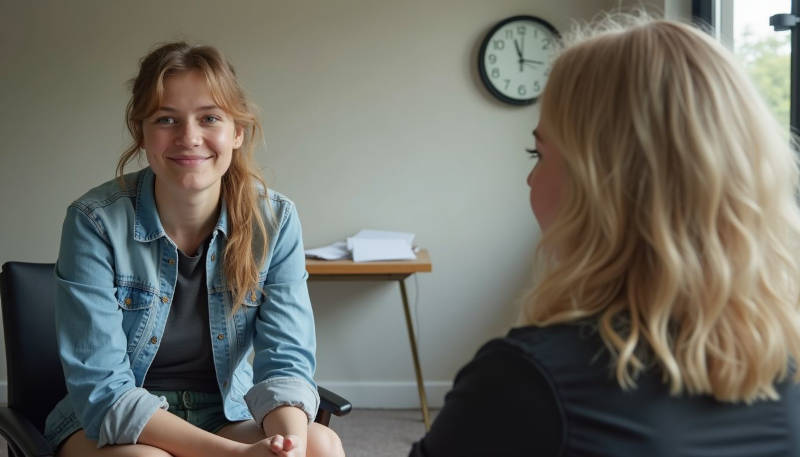
Conclusion
Pre-divorce counseling marks a vital step toward healing and clarity. My experience shows that proper preparation leads to better outcomes.
Dr. O, has many years of experience in pre-divorce counseling and bereavement support, shares her expert insights. She holds a Ph.D. and has helped over 1,000 couples through mediation processes.
“The first session creates a foundation for the entire counseling journey,” Dr. O explains. “Clients learn valuable tools for self-reflection and communication. These skills prove essential during the grieving process.”.
Dr. O emphasizes the importance of certified counselors who follow ethical guidelines. “Licensed professionals must maintain strict confidentiality and create a safe space for both partners.”.
“Make the most of your first session by staying open and honest,” Dr. O advises. “Take notes, ask questions, and practice the suggested exercises at home.”.
The benefits of pre-divorce counseling include reduced stress and better co-parenting outcomes. Potential challenges might include initial discomfort or resistance from one partner.
Dr. O suggests individual therapy sessions alongside couple meetings for maximum benefit.
“Pre-divorce counseling helps couples make informed decisions about their future,” Dr. O concludes. “The first session starts this important process of growth and understanding.
FAQs
1. What happens in the first pre-divorce counseling session?
Your counselor will explain the mediation process and discuss your goals for therapy. This first meeting helps set clear expectations for future sessions.
2. Is individual therapy better than joint sessions for pre-divorce counseling?
Individual therapy offers a safe space to process your feelings without your spouse present. You can freely share concerns and work through personal issues at your own pace.
3. How does pre-divorce counseling help with the grieving process?
Pre-divorce counseling guides you through bereavement and helps you accept the end of your marriage. The counselor provides tools to manage emotions and move forward.
4. Will TheTeenDoc offer support for my children during this process?
TheTeenDoc provides specialized support to help children cope with family changes. They focus on age-appropriate strategies that protect your children’s emotional well-being during this transition.
